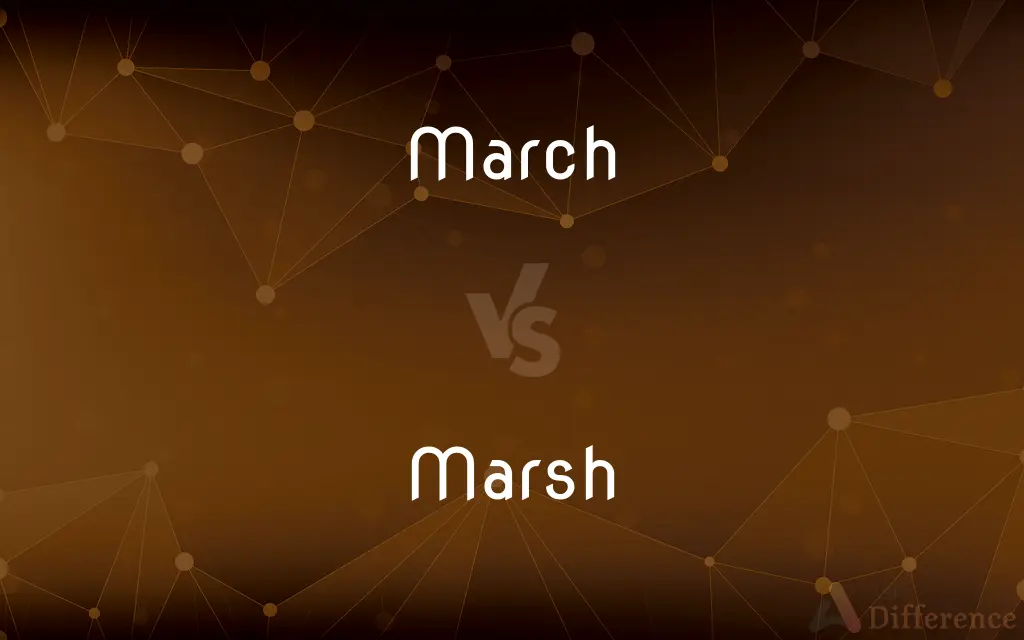March vs. Marsh — What's the Difference?
By Tayyaba Rehman & Maham Liaqat — Updated on March 18, 2024
"March" refers to the third month of the year in the Gregorian calendar, while "Marsh" is a type of wetland often characterized by waterlogged soils and aquatic plants.

Difference Between March and Marsh
Table of Contents
ADVERTISEMENT
Key Differences
March is known as the third month in the Gregorian calendar, marking a transition from winter to spring in the Northern Hemisphere. It's a time of significant change, with longer days and budding plant life signaling the end of the cold season. Marsh, on the other hand, is a term used to describe a wetland that is frequently or continually inundated with water. Characterized by soft, muddy ground and dominated by water-loving plants, marshes play a crucial role in the ecosystem, providing habitat for a diverse range of wildlife.
While March is associated with specific cultural and historical events, such as St. Patrick's Day and the start of spring, marshes are valued for their ecological significance. They serve as critical habitats for many species, act as natural water filtration systems, and help in flood mitigation. The importance of March extends beyond its place in the calendar; it symbolizes renewal and growth. Conversely, the value of marshes lies in their environmental functions and biodiversity support.
The observance of March involves various traditions and holidays, reflecting human social and cultural practices. It includes celebrations of seasonal changes, historical commemorations, and religious events. Marshes, however, are observed through the lens of environmental science and conservation, emphasizing the need for protection and sustainable management due to their ecological benefits and vulnerability to human impact.
March impacts human activities in several ways, from agriculture to festivals, as it often represents a change in weather and daylight hours, influencing outdoor activities and mood. In contrast, marshes impact the environment and biodiversity, offering services like water purification, flood control, and habitat provision, which are essential for ecological balance and health.
In summary, March is significant for its position in the calendar and the cultural, historical, and seasonal changes it represents, while marshes are crucial for their environmental roles and the biodiversity they support. Both have their distinct places in human and natural contexts, each contributing uniquely to our experience of time and nature.
ADVERTISEMENT
Comparison Chart
Definition
The third month of the Gregorian calendar.
A type of wetland with waterlogged soil.
Significance
Marks a transition from winter to spring.
Important for ecological balance and biodiversity.
Observance
Associated with various cultural and historical events.
Focused on conservation and environmental science.
Impact
Influences human activities and mood.
Affects environmental health and biodiversity.
Representation
Symbolizes renewal and growth.
Represents ecological function and vulnerability.
Compare with Definitions
March
The third month of the year, known for the transition from winter to spring.
The snow finally began to melt in March, signaling the start of spring.
Marsh
A wetland area that remains saturated with water, supporting aquatic plants.
The marsh was teeming with birdlife, from herons to ducks.
March
A period marked by specific seasonal and cultural events.
March is notable for St. Patrick's Day celebrations.
Marsh
Characterized by soft, muddy ground and standing water.
Walking through the marsh required waterproof boots due to the muddy ground.
March
Represents a time of change and renewal in many cultures.
Many people start their spring cleaning in March.
Marsh
Serves as a habitat for a wide variety of wildlife.
The marsh provided a perfect nesting ground for the endangered species.
March
Associated with certain natural phenomena, like the return of migratory birds.
The arrival of migratory birds in March is a sign of spring.
Marsh
Acts as a natural water filtration system.
The marsh helped purify the runoff water before it reached the river.
March
The month in which daylight saving time typically begins in many places.
We set our clocks forward an hour in March.
Marsh
Plays a crucial role in flood control and mitigation.
The expansive marsh absorbed the excess rainwater, preventing floods downstream.
March
March is the third month of the year in both the Julian and Gregorian calendars. It is the second of seven months to have a length of 31 days.
Marsh
A marsh is a wetland that is dominated by herbaceous rather than woody plant species. Marshes can often be found at the edges of lakes and streams, where they form a transition between the aquatic and terrestrial ecosystems.
March
To walk steadily and rhythmically forward in step with others.
Marsh
An area of low-lying land which is flooded in wet seasons or at high tide, and typically remains waterlogged at all times
Marsh plants
Patches of marsh
The marsh marigold loves damp fields, riverbanks, and marshes
March
To begin to move in such a manner
The troops will march at dawn.
Marsh
An area of low-lying land that is usually saturated with water and is dominated by herbaceous rather than woody plants.
March
To proceed directly and purposefully
Marched in and demanded to see the manager.
Marsh
An area of low, wet land, often with tall grass.
March
To progress steadily onward; advance
Time marches on.
Marsh
A tract of soft wet land, commonly covered partially or wholly with water; a fen; a swamp; a morass.
March
To participate in an organized walk, as for a public cause.
Marsh
Low-lying wet land with grassy vegetation; usually is a transition zone between land and water;
Thousands of acres of marshland
The fens of eastern England
March
To cause to move or otherwise progress in a steady rhythmical manner
March soldiers into battle.
Marched us off to the dentist.
Marsh
United States painter (1898-1954)
March
To traverse by progressing steadily and rhythmically
They marched the route in a day.
Marsh
New Zealand writer of detective stories (1899-1982)
March
To have a common boundary
England marches with Scotland.
March
The steady forward movement of a body of troops.
March
A long tiring journey on foot.
March
Steady forward movement or progression
The march of time.
March
A regulated pace
Quick march.
Slow march.
March
The distance covered within a certain period of time by moving or progressing steadily and rhythmically
A week's march away.
March
(Music) A composition in regularly accented, usually duple meter that is appropriate to accompany marching.
March
An organized walk or procession by a group of people for a specific cause or issue.
March
The border or boundary of a country or an area of land; a frontier.
March
A tract of land bordering on two countries and claimed by both.
March
The third month of the year in the Gregorian calendar. See Table at calendar.
March
A formal, rhythmic way of walking, used especially by soldiers, bands and in ceremonies.
March
A political rally or parade
March
Any song in the genre of music written for marching (see Wikipedia's article on this type of music)
March
Steady forward movement or progression.
The march of time
March
(euchre) The feat of taking all the tricks of a hand.
March
A border region, especially one originally set up to defend a boundary.
March
(historical) A region at a frontier governed by a marquess.
March
Any of various territories with similar meanings or etymologies in their native languages.
March
(obsolete) Smallage.
March
(intransitive) To walk with long, regular strides, as a soldier does.
March
(transitive) To cause someone to walk somewhere.
March
To go to war; to make military advances.
March
(figurative) To make steady progress.
March
(intransitive) To have common borders or frontiers
March
The third month of the year, containing thirty-one days.
The stormy March is come at last,With wind, and cloud, and changing skies.
March
A territorial border or frontier; a region adjacent to a boundary line; a confine; - used chiefly in the plural, and in English history applied especially to the border land on the frontiers between England and Scotland, and England and Wales.
Geneva is situated in the marches of several dominions - France, Savoy, and Switzerland.
Lords of waste marches, kings of desolate isles.
March
The act of marching; a movement of soldiers from one stopping place to another; military progress; advance of troops.
These troops came to the army harassed with a long and wearisome march.
March
Hence: Measured and regular advance or movement, like that of soldiers moving in order; stately or deliberate walk; steady onward movement; as, the march of time.
With solemn marchGoes slow and stately by them.
This happens merely because men will not bide their time, but will insist on precipitating the march of affairs.
March
The distance passed over in marching; as, an hour's march; a march of twenty miles.
March
A piece of music designed or fitted to accompany and guide the movement of troops; a piece of music in the march form.
The drums presently striking up a march.
March
To border; to be contiguous; to lie side by side.
That was in a strange landWhich marcheth upon Chimerie.
March
To move with regular steps, as a soldier; to walk in a grave, deliberate, or stately manner; to advance steadily.
March
To proceed by walking in a body or in military order; as, the German army marched into France.
March
To cause to move with regular steps in the manner of a soldier; to cause to move in military array, or in a body, as troops; to cause to advance in a steady, regular, or stately manner; to cause to go by peremptory command, or by force.
March them again in fair array.
March
The month following February and preceding April
March
The act of marching; walking with regular steps (especially in a procession of some kind);
It was a long march
We heard the sound of marching
March
A steady advance;
The march of science
The march of time
March
A procession of people walking together;
The march went up Fifth Avenue
March
District consisting of the area on either side of a border or boundary of a country or an area;
The Welsh marches between England and Wales
March
Genre of music written for marching;
Sousa wrote the best marches
March
A degree granted for the successful completion of advanced study of architecture
March
March in a procession;
They processed into the dining room
March
Force to march;
The Japanese marched their prisoners through Manchuria
March
Walk fast, with regular or measured steps; walk with a stride;
He marched into the classroom and announced the exam
The soldiers marched across the border
March
March in protest; take part in a demonstration;
Thousands demonstrated against globalization during the meeting of the most powerful economic nations in Seattle
March
Walk ostentatiously;
She parades her new husband around town
March
Cause to march or go at a marching pace;
They marched the mules into the desert
March
Lie adjacent to another or share a boundary;
Canada adjoins the U.S.
England marches with Scotland
Common Curiosities
What defines the month of March?
March is defined as the third month in the Gregorian calendar, often associated with the transition from winter to spring in many cultures.
What role does March play in agriculture?
In agriculture, March often marks the beginning of planting seasons in many regions, influenced by the changing weather.
Why are marshes important for the environment?
Marshes are important for their ecological functions, such as water filtration, flood control, and supporting biodiversity.
How do conservation efforts target marshes?
Conservation efforts for marshes often involve protecting areas from development, restoring damaged wetlands, and promoting sustainable land use practices.
What is a marsh?
A marsh is a type of wetland characterized by waterlogged soil and aquatic vegetation, providing critical habitat for diverse wildlife.
Can March have different weather patterns in various regions?
Yes, weather patterns in March can vary significantly across regions, from spring-like conditions in some areas to continued winter in others.
How do humans impact marshes?
Human activities, such as urban development, agriculture, and pollution, can impact marshes, threatening their ecological health and functions.
What traditions are associated with March?
Traditions in March vary globally, including spring festivals, agricultural rituals, and historical commemorations.
How do cultural events relate to March?
Cultural events in March include holidays and festivals like St. Patrick's Day, reflecting historical and seasonal significance.
How are marshes affected by climate change?
Climate change can affect marshes by altering water levels, salinity, and the distribution of plant and animal species within them.
Is March significant in any astronomical events?
March includes significant astronomical events like the vernal equinox, marking the start of spring in the Northern Hemisphere.
How do daylight changes in March affect human activities?
Changes in daylight in March, including the start of daylight saving time in many regions, can affect human activities by extending daylight hours.
What wildlife is typically found in marshes?
Marshes are home to a variety of wildlife, including birds, amphibians, fish, and numerous plant species adapted to wet conditions.
What are the main threats to marsh ecosystems?
Main threats to marsh ecosystems include habitat loss due to development, pollution, invasive species, and climate change impacts.
How does March symbolize renewal?
March symbolizes renewal through the onset of spring, bringing new growth in plants, milder weather, and a fresh start in various cultural traditions.
Share Your Discovery

Previous Comparison
Pedantic vs. Pedestrian
Next Comparison
Censer vs. ThuribleAuthor Spotlight
Written by
Tayyaba RehmanTayyaba Rehman is a distinguished writer, currently serving as a primary contributor to askdifference.com. As a researcher in semantics and etymology, Tayyaba's passion for the complexity of languages and their distinctions has found a perfect home on the platform. Tayyaba delves into the intricacies of language, distinguishing between commonly confused words and phrases, thereby providing clarity for readers worldwide.
Co-written by
Maham Liaqat













































